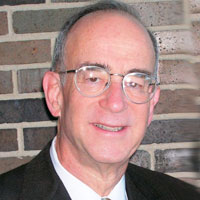
Overtreatment 'Successes'—What Are the Negative Consequences for Patients, Dentists, and the Profession?
1.0 continuing education credit
Course Description
In many TMD cases, identifying overtreatment successes proves elusive, as both patients and treating dentists often perceive satisfaction because of the positive outcomes. Yet, the critical question remains unanswered: has an excessive amount of treatment been administered? Consequently, it is imperative to underscore the significance of this discourse, which delves into the ethical and practical dimensions of distinguishing between appropriate treatment and potential overtreatment. While patient satisfaction is obviously desirable, it is our responsibility to ensure that the treatment provided fits within an ethical framework.
Our Panel

Jeffrey Okeson
Dr. Okeson is Professor and Dean of the University of Kentucky College of Dentistry. He is also the founder of the College's Orofacial Pain program which he established in 1977. Dr. Okeson has more than 240 publications in the area of occlusion, TM disorders and orofacial pain in various national and international journals. He is past president of both the American Academy of Orofacial Pain and the American Board of Orofacial Pain. He has authored two textbooks on TM disorders and orofacial pain, which have been translated into eleven different languages. Dr. Okeson is a very sought after lecturer on the subject of TMD and orofacial pain and has presented more than 1300 invited lectures on the subject of TMD and orofacial pain in all 50 states and in 59 different countries. He has received the campus wide University of Kentucky "Great Teacher Award", the Provost's Distinguished Service Professorship, the University of Kentucky Hall of Distinguished Alumni Award, the American Academy of Orofacial Pain's Service Award, and the first ever "Distinguished Alumni Award" from the College of Dentistry. Dr. Okeson has also received "The International Dentist of the Year Award" from the Academy of Dentistry International. This is the highest award recognized by this Academy and was given to him in recognition of his worldwide efforts in providing education in the area of temporomandibular disorders and orofacial pain.

Gary Klasser
Dr. Gary D. Klasser obtained his dental degree from the University of Manitoba (Canada) in 1980. Over the next 22 years, he enjoyed the practice of general dentistry from both a public health and private practice perspective until he returned to graduate studies in 2002. In 2004, he completed his training and graduated from the University of Kentucky with a Certificate in Orofacial Pain. In 2005, he completed a fellowship in Oral Medicine/Oral Oncology at the University of Illinois at Chicago (UIC). From 2005 – 2011, he was an Assistant Professor and Director of the Oral Medicine/Orofacial Pain clinic at the College of Dentistry in the University of Illinois at Chicago. He is currently a Professor in the Department of Diagnostic Sciences at Louisiana State University, School of Dentistry and is involved in clinical research and teaching. Dr. Klasser has published in a number of peer reviewed journals and has contributed chapters to various textbooks while serving as an editorial reviewer for a number journals. He is also co-editor of the 5th edition of the American Academy of Orofacial Pain book entitled: Orofacial Pain: Guidelines for Assessment, Diagnosis, and Management.

Daniele Manfredini
Dr. Daniele Manfredini received his DDS from the University of Pisa, Italy in 1999, an MSc in Occlusion and Craniomandibular Disorders in 2001 from the same University, and a Ph.D. in Dentistry from the ACTA Amsterdam, The Netherlands, in 2011. He was a clinical fellow at the Section of Prosthetic Dentistry, Department of Neuroscience, University of Pisa, Italy until 2005. Since 2006, Dr. Manfredini has been an Assistant Professor and coordinator of the research projects at the TMD Clinic, Department of Maxillofacial Surgery, University of Padova, Italy. In January 2014, the Italian Ministry of University and Research (MIUR) appointed him as an Associate Professor by scientific merit at the age of 38.
Dr. Manfredini authored more than 130 papers in the field of bruxism and temporomandibular disorders in journals indexed in the Medline database. He edited the book "Current concepts on temporomandibular disorders" (Quintessence Publishing, 2010), including contributions from 45 world-renowned experts. Based on publication ratings, since November 2013, the US agency Expertscape has ranked Dr. Manfredini as the world's #1 expert in the field of temporomandibular joint disorders, and #3 in the field of bruxism.

Charles Greene
Dr. Greene has been involved for many years in clinical research and teaching in the area of temporomandibular disorders and orofacial pain. From 1965-1984 he worked with Dr. Daniel Laskin in the UIC College of Dentistry TMJ and Facial Pain Research Center. From 1986 to 1995 he worked at Northwestern University Dental School with Dr. Harold Perry as co-director of their TMD Clinic. After returning to UIC in 1995, Dr. Greene served as Director of Orofacial Pain Studies. He was a Clinical Professor in the Department of Orthodontics at UIC, and he has contributed many articles and lectures to the orthodontic specialty in the USA and abroad. He has published over 150 articles, book chapters, and abstracts, and was co-editor of a multi-author book about temporomandibular disorders (Quintessence, 2006). A new multi-author book on TMDs co-edited by Dr. Greene and Dr. Laskin was released by Quintessence in 2013. In 2015 Dr. Greene was one of four co-editors on a book entitled "TMD and Orthodontics" published by Springer. He is a Life Member of the American Academy of Orofacial Pain as well as the International Association for Dental Research. He retired from UIC in 2018 and is currently Clinical Professor Emeritus.
Recorded September 30, 2023
![]() American Academy of Orofacial Pain is an ADA CERP Recognized Provider. ADA CERP is a service of the American Dental Association to assist dental professionals in identifying quality providers of continuing dental education. ADA CERP does not approve or endorse individual courses or instructors, nor does it imply acceptance of credit hours by boards of dentistry. American Academy of Orofacial Pain designates this activity for continuing education credits.
American Academy of Orofacial Pain is an ADA CERP Recognized Provider. ADA CERP is a service of the American Dental Association to assist dental professionals in identifying quality providers of continuing dental education. ADA CERP does not approve or endorse individual courses or instructors, nor does it imply acceptance of credit hours by boards of dentistry. American Academy of Orofacial Pain designates this activity for continuing education credits.


